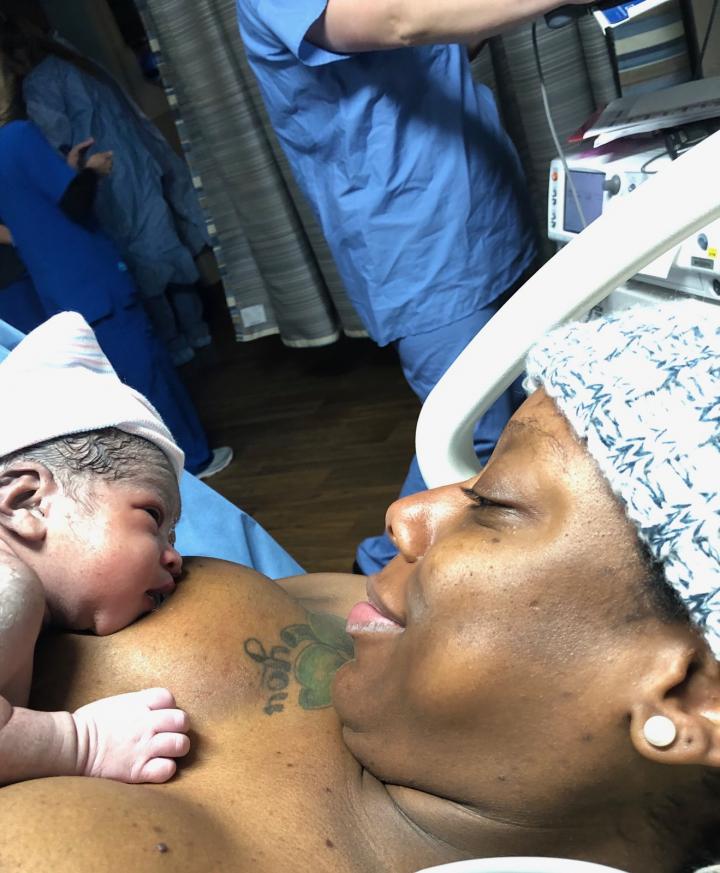
Credit: Baptist Memorial Hospital
A new paper published in Pediatrics links successful implementation of Baby-Friendly™ practices in the southern U.S. with increases in breastfeeding rates and improved, evidence-based care. The changes were especially positive for African-American women.
Between 2014 and 2017, 33 hospitals enrolled into the CHAMPS (Communities and Hospitals Advancing Maternity Practices) program out of Boston Medical Center’s Center for Health Equity, Education and Research, funded by the W. K. Kellogg Foundation. All birthing hospitals in Greater New Orleans, and 18 in Mississippi, signed up. Breastfeeding initiation at CHAMPS hospitals rose from 66 percent to 75 percent, and, among African Americans, from 43 percent to 63 percent, over the 3 years. The gap between White and Black breastfeeding rates decreased by 9.6 percent.
“U.S. breastfeeding rates differ by race,” says Anne Merewood, PhD MPH, a Boston Medical Center researcher and the lead author on the study. “This is the first study that links better compliance with the WHO’s Ten Steps to Successful Breastfeeding to lower racial inequities across a large number of hospitals.”
Lakendrea Bush gave birth to her first daughter, Aubreigh, at Baptist Memorial Hospital, North Mississippi, on December 7th, 2018. The hospital is part of the CHAMPS program and working on improved maternal infant care.
“It was a wonderful blessing, a humbling and beautiful experience,” says Lakendrea. “We had skin to skin for a whole hour after birth. Some hospitals take the baby away, but not this one,” she said. “I cried. I gave her her first feed. It was my first child, and she was looking at me, and me at her. My husband was coaching me along. It was almost surreal.”
Merewood, an associate professor of pediatrics at Boston University School of Medicine, says the fresh look at maternity care has led to the end of many outdated hospital policies and practices across the state. “We had hospitals routinely separating mothers and babies for 7 or more hours after birth; hospitals giving all babies glucose water, and some hospitals still breast-binding, even though the evidence against breast binding was pretty much settled in the 1960’s. A lot of these practices were only being done because they’d ‘always been done’, and have now been discontinued.”
Lakendrea also loved the hospital’s ‘rooming in’ policy, which keeps mothers and babies together. “I really wanted my baby with me. I didn’t want them to take her away. I’m breastfeeding as well, so it really helped to have her there.” Lakendrea had some early challenges with breastfeeding but one month on says it’s now going well. “It was difficult sometimes, but you know the baby’s getting the best food, so everything else goes out of the window really,” she said.
CHAMPS received new funds from the W. K. Kellogg Foundation and the Bower Foundation in 2017 to continue the work. Now, 38 of 42 Mississippi birthing hospitals are working with CHAMPS and 8 Mississippi hospitals are Baby-Friendly, up from zero in 2014. In December 2018, the Bower Foundation gave CHAMPS a new, 3-year grant to help continue the program in designated hospitals, with a focus on sustaining evidence based maternity practices in Mississippi, and making Baby-Friendly policies the norm.
As for Lakendrea, she says, “I really, really loved the experience. I’m already getting ready to have another baby!”
###
Media Contact
Jessica Lyons
[email protected]
617-638-6838




